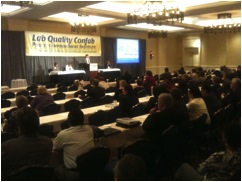Quality management systems (QMS) attracts plenty of attention on day one of this conference
DATELINE: San Antonio, Texas—ISO 15189 Medical Laboratories was clearly a hot topic yesterday at the Fourth Annual Lab Quality Confab and Process Improvement Institute. Almost every session devoted to quality management systems (QMS) and ISO 15189 had a standing-room-only audience.
Here in San Antonio, about 250 clinical laboratory managers and pathologists from several different countries have gathered to learn innovative ways to use Lean, Six Sigma, and similar process improvement methods in their laboratories. Day one was marked by high-energy networking and the Lean Six Sigma case studies that demonstrate the power of these performance improvement projects to deliver major gains in turnaround times and staff productivity while reducing errors and lowering costs.
Clinical Laboratories Will Need to Adopt a Quality Management System
One theme of this year’s Lab Quality Confab is QMS—quality management systems. In the opening address, Robert Michel, who produces Lab Quality Confab and is Editor-In-Chief of The Dark Report and Dark Daily, noted that clinical laboratories in the United States and other developed countries around the globe are under increased pressure to raise the quality of analytical results, even as reimbursement for laboratory testing services is declining. He asserted that clinical laboratories will need to adopt a quality management system in order to provide the framework necessary to continuously improve the analytical quality of laboratory testing.
This was affirmed by the next speaker, who was Luci Berte, President of Laboratories Made Better! Step-by-step, Berte explained how and why an appropriate QMS is an ideal solution. She caught the audience’s attention when she declared that, “traditionally, a medical laboratory has typically designated just one individual to be responsible for quality. Often, the QA/QC manager is given this role.
“Guess what!” she continued. “This approach to lab test quality has never worked. It is impossible for one person to oversee all the activities that contribute to quality. Laboratories can solve this problem by introducing a QMS. Once a laboratory adopts a QMS, every staff member in the laboratory becomes responsible for quality as they carry out their duties according to the specifications of the QMS.”
Next to the Lab Quality Confab podium was Chinu Jani, who is General Manager and Vice President of Spectra Laboratories East in Rockleigh, New Jersey. Jani’s laboratory recently earned accreditation to ISO 15189. It handles as many as 18,000 specimens per night and is one of the nation’s largest laboratory testing facilities.
Benefits to Use of ISO 15189 Medical Laboratories
Jani made a persuasive case that accreditation to ISO 15189 brings substantial and ongoing benefit to the clinical laboratory. The QMS embedded in ISO 15189 has helped his laboratory team map the flow of work (FOW), then guide ongoing improvements to FOW. Policies, procedures, and all necessary documentation within the laboratory were organized in a consistent manner and are now accessible by all staff members. Most importantly, in daily use, the QMS now supports a more sophisticated assessment and monitoring of the quality of the laboratory test results produced by Spectra.
To close this morning session, Chris Christopher, Vice President of Global Customer Solutions at Siemens Healthcare Diagnostics, provided a vision of the “virtual laboratory of the future.” “Multi-site laboratory organizations will become increasingly more common,” he predicted. “Because of the inadequate supply of medical technologists and the ongoing erosion in laboratory reimbursement, there will be more use of laboratory automation and similar solutions.
“But the intriguing part of the future is how integrated informatics capabilities—in tandem with automated analyzers—will make it feasible for clinical laboratory managers to run these multi-site laboratory organizations from a central location,” explained Christopher. “The glue that will bind together all the different lab testing sites will be adoption of a QMS and use of continuous improvement methods. In my work with medical laboratories around the world, I see first-mover labs taking these steps to move toward this future state.”
As you read this, the final day of Lab Quality Confab will be taking place. In coming weeks, Dark Daily and The Dark Report will share some of the more spectacular successes that were presented at this year’s Lab Quality Confab.
Dates for Lab Quality Confab in 2011 have not yet been announced. If you would like to be notified about the details of the Fifth Annual Lab Quality Confab, email info@darkdaily.com with “Lab Quality Confab” in the subject line.
Related Information:
Lab Quality Confab email signup and information





A systems approach makes a significant improvement in conceptualising,planning and monitoring the compliance to required specifications.
A free copy is requested to fine-tune a talk to medical & phrmaceutical students.